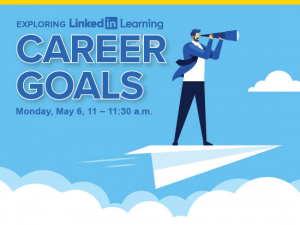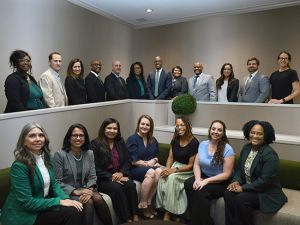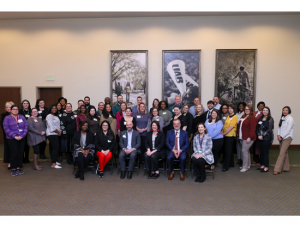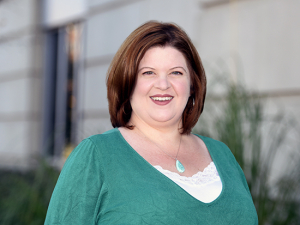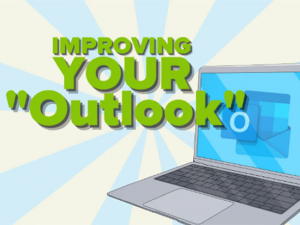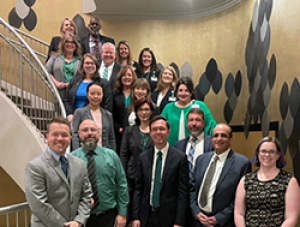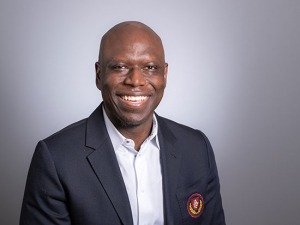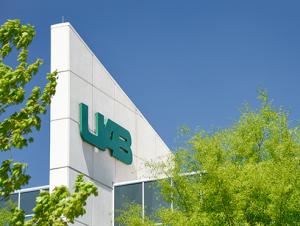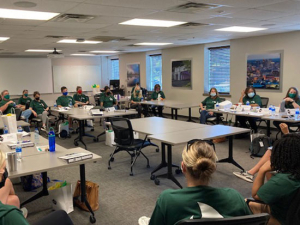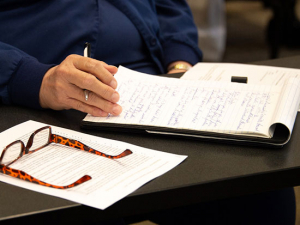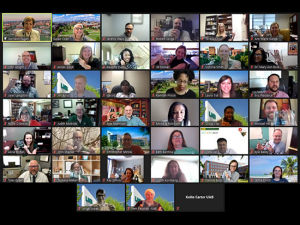UAB employees identified three key areas for improvement in the 2017 Campus Engagement Survey: communication, career development/leadership and performance management. New programs and initiatives have been launched to address these elements from an administrative standpoint, and everyone can play a part in building a better UAB. During the next few weeks, the UAB Reporter will explore free resources, training opportunities and expert advice to help you hone your skills. Read the first story in this series, "7 tips for communicating in a changing world."
 What qualities matter most in a leader? Alesia Jones, UAB's chief human resources officer, shares advice on building leadership skills at any level.When Alesia Jones was 21, she and two friends made a list of all the things they wanted to achieve by the time they were 40. “One of mine was to be in the top human resources job at a large organization,” said Jones, chief human resources officer at UAB. So, check? “I ended up a few years off,” she said with a laugh. In her role, Jones participates in UAB’s most high-profile job candidate searches. What qualities matter most?
What qualities matter most in a leader? Alesia Jones, UAB's chief human resources officer, shares advice on building leadership skills at any level.When Alesia Jones was 21, she and two friends made a list of all the things they wanted to achieve by the time they were 40. “One of mine was to be in the top human resources job at a large organization,” said Jones, chief human resources officer at UAB. So, check? “I ended up a few years off,” she said with a laugh. In her role, Jones participates in UAB’s most high-profile job candidate searches. What qualities matter most?
Communicating the vision
“The ability to communicate effectively, both in writing and verbally, is critical,” Jones said. “People have to be able to see what is not there now while seeing themselves as a part of the team to make it happen.”
Navigating relationships
“UAB is a complex place, so you also have to be able to work collaboratively with others in order to make progress,” Jones continued. “Very little happens within silos. You have to seek out and even create opportunities for interactions so those relationships are in place down the road.”
Committing to excellence
“This may sound cliché, but the people I’ve seen who have been the most successful are those who are committed to excellence,” Jones said. “Doing enough to maintain the status quo just doesn’t cut it. You have to always be looking to take your work — and your team — to another level.”
Aligning leadership
As part of the Lead UAB initiative, launched in 2016, Jones and a board comprising senior faculty and staff leaders representing UAB’s academic and health missions worked to define what leadership means at UAB — “the ability to turn vision into reality” — and provide a consistent set of expectations for leaders at all levels of the institution. (See “Leadership Expectations” below.)
Leadership alignment was identified as a focus area during the 2017 Campus Engagement Survey. Quarterly meetings of all senior leadership began in January 2018. Meanwhile, in a series of Lead UAB roundtables, which began in August 2017, a team from Organizational Learning & Development has met with all UAB deans and vice presidents and their senior staffs to share the Leadership Expectations. The sessions also include a DISC assessment and discussion of behavioral styles.
Related
|
“All of us have limited resources: finances, human capital and time,” Jones said. “When there is misalignment of leadership, you end up not making the most effective use of any of those resources and the overall mission is impacted. The complexity of UAB means that we have to sync our academic mission, research mission, clinical mission and administrative functions. With all of our leaders aligned, we can reach our goal of being a world-class institution.”
Other learning opportunities
Leadership expectations and training are at the heart of two other programs launched since the 2017 Engagement Survey.
Management Fundamentals, which began in July 2017, is a six-part series for managers or aspiring managers who want to develop or hone their leadership skills for giving feedback, having difficult conversations, coaching and delegating. More than 160 participants took part in the pilot sessions in 2017, and some 150 participants have enrolled so far in 2018. The first Management Fundamentals workshop of 2019, Motivating Through Performance Management, will be held 9-11 a.m. Jan. 29; register online at uab.edu/learningsystem. Learn more at uab.edu/learndev. New managers also can find tools and resources with Learning and Development’s one-stop Manager’s Toolkit.
Leading at all Levels, which began in January 2018, is open to all employees. The three-part series includes hands-on training in communication skills for leaders, understanding leadership expectations and developing self-awareness. Four cohorts of 40 participants each have been through the program this year. The next cohort launches Jan. 15; register online at uab.edu/learningsystem.
Five steps to advancing your career
 The "Steps to Success" sculpture in the new Collat School of Business building. What steps can you take to succeed at UAB? Read on.Alabama’s largest employer offers plenty of opportunity. So where to begin? That was the topic of another new workshop series from Learning and Development in 2018, Taking Charge of Your Career. The three-part series, offered in conjunction with the UAB Staff Council, included practical advice from several longtime UAB employees, including Jones; Anita Clemon, assistant vice president for Institutional Equity and chair of the UAB Commission on the Status of Women; and LaKisha Mack, associate dean for Administration and Finance in the School of Medicine. Mack began her career at the university as a work-study student. “I made it clear that I wanted to work full-time at UAB,” Mack said. “I worked hard to be an asset. I always had a love for numbers and knew I wanted to be in finance, and I made the decision to start and end my career here because there is such great opportunity at UAB.” The series will be offered again in 2019.
The "Steps to Success" sculpture in the new Collat School of Business building. What steps can you take to succeed at UAB? Read on.Alabama’s largest employer offers plenty of opportunity. So where to begin? That was the topic of another new workshop series from Learning and Development in 2018, Taking Charge of Your Career. The three-part series, offered in conjunction with the UAB Staff Council, included practical advice from several longtime UAB employees, including Jones; Anita Clemon, assistant vice president for Institutional Equity and chair of the UAB Commission on the Status of Women; and LaKisha Mack, associate dean for Administration and Finance in the School of Medicine. Mack began her career at the university as a work-study student. “I made it clear that I wanted to work full-time at UAB,” Mack said. “I worked hard to be an asset. I always had a love for numbers and knew I wanted to be in finance, and I made the decision to start and end my career here because there is such great opportunity at UAB.” The series will be offered again in 2019.
Jones, Clemon and Mack, along with members of Organizational Learning & Development, share their top tips for advancing your career:
1. Craft a career plan
Where are you now? Where do you want to be? What will you have to learn or what skills will you need to develop? As you work through the plan, create timelines and accountability points. “Every time I entered a new job, I looked at the requirements and expectations of the next job and created my own personal to-do list,” Jones said. “Of course, you have to do your current job well, otherwise nothing else matters. But if you are thinking that where you are is not your final resting place, then figure out what your gaps are and how you can close them.”
Start Now: Watch these short videos on “Defining your professional goals” and “Know what your career goals are,” from Lynda/LinkedIn Learning (uab.edu/lynda), part of an expansive library of courses available free to UAB employees.
Read Up: “Activate Your Agile Career: How Responding to Change Will Inspire Your Life’s Work,” by Marti Konstant, offers training on future-proofing your current career and finding your most fulfilling career.
2. Stretch yourself to close gaps
Once you identify your gaps, you have to identify concrete steps to close them. “Always look for ways that you can expose yourself to learning opportunities," Jones advised. Ask:
- Is there something I can read?
- Is there an organization I can join?
- Is there a class I can take?
More in this series |
Networking may not be your comfort zone, but every connection you can make can play a role in advancing toward career goals. Consider joining an organization that connects with your personal and professional interests or identifying a special project you can champion. Clemon, in addition to serving as chair of the UAB Commission on the Status of Women (Jones also has held that role), is past president of the UAB National Alumni Society and the Birmingham Society for Human Resource Management, among other organizations. “I have been able to take advantage of professional development opportunities and get involved on committees and in professional and civic organizations both internally and external to UAB,“ Clemon said. ”Getting involved enabled me to expand my network and offered the opportunity to work successfully on teams and with a variety of individuals."
If there are no formal opportunities, consider volunteering. “If you see something that needs to be done or fixed or coordinated better, take the initiative to lead the project,” Mack said. “You have to be intentional to make yourself known. When I started, I was very shy, and if I wasn’t intentional about speaking up and being heard, I would have been overlooked.” What if it’s not clear what you can do? “In some positions, I said, ‘Can I just sit in the back of the room when you have a meeting?’” Jones said. “Anything you can do to expose yourself to an area where you are looking to grow will help.”
Start Now: Watch this short video on “Taking charge of your development” from Lynda/LinkedIn Learning.
Try It: Review the UAB Leadership Expectations with your team. Identify one competency your team believes it excels in and one competency you want to work on. Together, create actionable goals and a plan for measuring the results of your efforts.
3. Build your board of directors
Solicit an informal team of people who can aid your professional development. These can be inside and outside UAB and ideally should include people who are doing the kind of work you aspire to do. “Early in my career, I had the benefit of working with individuals who supported and encouraged me,” said Clemon. “They believed in me and recognized that I was capable of more.” In addition to supporters, it’s important to recruit “sponsors,” notes “Harvard Business Review.” These are senior leaders can advocate for you at promotion time. “What I’ve learned from my experience is the importance of fostering relationships so you can understand the landscape and work with people who can help you succeed,” Mack said. “I would intentionally reach out to people who were in positions that I wanted to be in and meet with them on a regular basis, whether it was a phone call or a lunch or meeting for coffee. I would ask: What helped you — is it more education, is it getting out into the field? I’d also ask: What challenges have you had, so I won’t make the same mistakes? Each person I met with gave me a different nugget I could walk away with.”
Start Now: Help identify useful opportunities with the short video, “Which networking events should you attend?” from Lynda/LinkedIn Learning.
Learn How: Sign up for Learning and Development’s Developing Positive Relationships at Work workshop to discover ways to create an individual development plan, demonstrate actions that build trust and model positive relationship behaviors to others. The next workshop is 9-12 p.m. Jan. 30; register online at uab.edu/learningsystem. Learn more at uab.edu/learndev.
4. Realize that setbacks are just new opportunities
Sometimes, despite all your efforts, the next step will stay just out of reach. When she was 39, Jones realized her goal of leading an HR organization by 40 wasn’t going to happen. “There wasn’t one open, and I wasn’t ready,” she said. “I had to position myself to wait and continue to learn. What else can I do to be ready when the opportunity comes?”
Learn How: Sign up for Learning and Development’s Emotional Intelligence workshop to discover how to bounce back from setbacks, adopt a more optimistic outlook and respond more quickly and positively to changing circumstances. The next workshop is 1-4 p.m. Feb. 20; register online at uab.edu/learningsystem. Learn more at uab.edu/learndev.
Read Up: “The Four Disciplines of Execution: Achieving Your Wildly Important Goals,” by Chris McChesney, Sean Covey and Jim Huling, offers repeatable practices to build a “cadence of accountability” and more to implement your strategic priorities.
5. Take the long view
We live in an age of increasing lifespans — and extended working lives, too. Whether you are looking for a career change or happy where you are, education should always be part of your plan. “I consider myself a continuous learner in my field, which helps me understand the trends and future of the profession," Clemon said.
Read Up: “A Long Bright Future: Happiness, Health and Financial Security in an Age of Increased Longevity,” by Laura Carstensen, offers guidance on planning for the “30 more years of life, on average,” that we all gained from the health advances of the 20th century.





